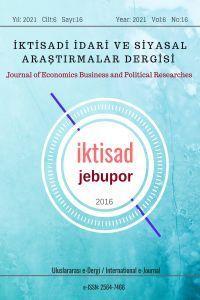Causality Relationship Between Government Stability and Trade Openness: The Case of Turkey
Causality Relationship Between Government Stability and Trade Openness: The Case of Turkey
Author(s): Yılmaz AriSubject(s): National Economy, Supranational / Global Economy, Recent History (1900 till today), Economic policy, Government/Political systems, International relations/trade, Economic development
Published by: Haci Mustafa Paksoy
Keywords: Government stability; political risk; trade openness; Turkish economy; vector error correction model;
Summary/Abstract: International trade is very exposed to political risk and the existence of political risk components in a given market may cause problems in both export and import activities. Government instability is one of the political risk components that is related with trade openness. The paper examines the government stability-trade openness nexus for Turkey using Vector Error Correction Model (VECM) and VECM based Granger Causality test covering the period of 1984-2016. Results have shown that there is a unidirectional causality in the long run from trade openness to government stability. Because Turkey’s production of final goods usually is based on imports, an increase in exchange rate usually floats trade openness in favor of imports. This creates foreign trade deficit. Worsening economic conditions affects the government stability. Due to the unfavorable picture and economic crises in Turkey, the average duty time of the governments established between 1990-2003 was one year. Despite this, export-led growth and highest amount of foreign direct investment within three election periods starting from 2002, enabled the individuals to grasp the importance of stability in governance. During the 2010s, Turkey struggled with the foreign trade deficit, high inflation and unemployment rates brought about by the high exchange rate, and the deteriorating economic situation caused the ministers in the cabinet and even the presidential system to change. Thus, the study concluded that trade openness may affect the policy-relevant implications and create government instability for Turkey through changes in exchange rates and depreciation of Turkish lira.
Journal: İktisadi İdari ve Siyasal Araştırmalar Dergisi (İKTİSAD)
- Issue Year: 6/2021
- Issue No: 16
- Page Range: 422-431
- Page Count: 10
- Language: Croatian

